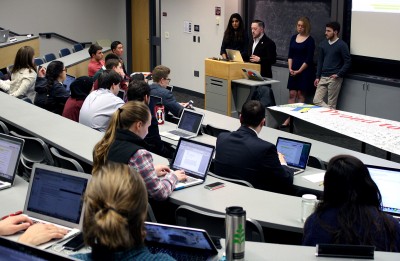
The Boston University Student Government Senate gathered Monday to elect the Senate chair for the 2015-16 academic year and charter two standing committees for the Expect More and 16,000 Strong Campaign initiatives.
The meeting also approved funding for the Hydration Station initiative and tabled a by-law that covers referendum policies on the election ballot.
Stephen Chang, current Senate chair, and Rich Driscoll, chairman of the Election Oversight Committee, ran for Senate chair. Both candidates described their goals for the office.
Driscoll, a senior in the College of Arts and Sciences, said he hopes to impact BU by encouraging outreach, promoting transparency and creating an approachable environment.
Chang, a junior in CAS, spoke of unity to accomplish goals through accountability, reform, outreach, professionalism and empowerment.
Members of Senate voted to re-elect Chang as chair. Chang received 18 votes while Driscoll received 15.
Chang said the result of the vote was reassuring and that he hopes to continue bringing change to Senate.
“That’s what I’m looking forward to, continuing to bring efficiency to Senate and helping students know what we’re doing here,” he said after the meeting.
Senate chartered SG’s two main campaigns as standing committees, which were both initially presented as initiatives for Senate early in the spring 2015 semester.
Expect More, a text-based survey program that aims to gather students’ feedback, passed unanimously with 33 votes. Robbie Brussell, SG’s current communication director, was named chairman of the committee.
Brussell, a junior in the Questrom School of Business, said creating the committee gives the program a more official presence on campus and sense of permanence.
“It’s great to establish longevity. It’s just the next step that we’re taking,” he said after the meeting. “What would be different next semester is that we can actually send out the surveys and reach out to the administration to see what they want to know.”
SG’s sexual assault awareness campaign 16,000 Strong was approved with 32 votes in favor, no nays and one abstention.
Will Horne, chairman of the committee and SG’s vice president of finance, said the having the committee will further formalize its legitimacy within SG.
“It’s really good that 16,000 Strong got confirmed for next year especially because of how successful we’ve been this semester,” said Horne, a sophomore in Questrom. “Next year is going to be a lot more outreach to different student groups, expanding the committee. Our goal is to get 8,000 signatures on our pledge next year.”
Senate approved a $300 budget for Hydration Station, which will fund snacks and beverages for the BU community to watch the Boston Marathon. The measure passed unanimously with 33 votes.
“We emphasize in providing a good and fun service for students,” said Avi Levy, the chairman of the Rules Committee and a senior in CAS. “It’s beneficial because students would be able to stay hydrated. Many people don’t realize this, but it’s very easy to get dehydrated and over-heated.”
The program has been going on at BU for three years, and this year has the same budget as 2014’s, Levy said.
During by-law review, Senate members debated over a law in the legislation section, which states that “proposals that seek to place a referendum, measure or similar policy-based initiative on the election ballot” are not allowed to be proposed in Senate meetings.
Levy said a referendum does not guarantee that change will be made and that “there are other modes of obtaining information from students.”
Driscoll said the Student Elections Commission treated the fossil fuel divestment referendum on this year’s SG ballot as if it were a candidate rather than a ballot item. The referendum belongs to SG, and it should not be grouped in with campaigning, he said.
The by-law debate was tabled until the next Senate meeting under a motion passed by 24 votes, five nays and four abstentions.
“It was worth tabling [the by-law] because so many senators were concerned about this particular aspect,” Driscoll said after the meeting. “When we revisit [the topic], we should uphold the same language that was used in the by-laws.”



















































































































